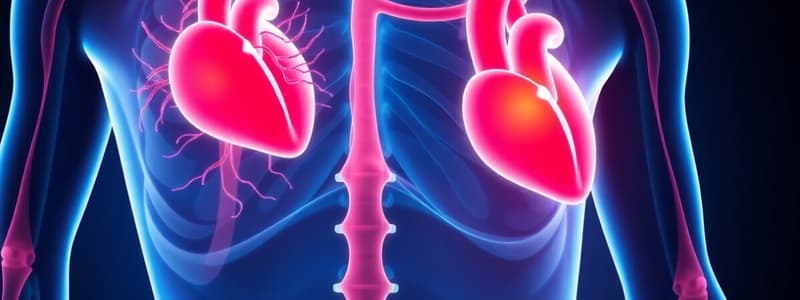Podcast
Questions and Answers
Which of the following is NOT considered a major criterion for diagnosing rheumatic fever?
Which of the following is NOT considered a major criterion for diagnosing rheumatic fever?
- Polyarthritis
- Joint pain without swelling (correct)
- Chorea
- Erythema marginatum
What is the most commonly affected heart valve in rheumatic carditis?
What is the most commonly affected heart valve in rheumatic carditis?
- Mitral valve (correct)
- Aortic valve
- Pulmonary valve
- Tricuspid valve
Which symptom is associated with rheumatic chorea?
Which symptom is associated with rheumatic chorea?
- Involuntary muscle movements (correct)
- Fever above 39°C
- Swollen joints
- Tender nodules
Which diagnostic procedure is NOT typically associated with confirming rheumatic fever?
Which diagnostic procedure is NOT typically associated with confirming rheumatic fever?
What is the characteristic feature of subcutaneous nodules in rheumatic fever?
What is the characteristic feature of subcutaneous nodules in rheumatic fever?
Flashcards
What is rheumatic fever?
What is rheumatic fever?
An inflammatory disease that mainly affects the joints and heart, but can also impact the central nervous system, skin, and subcutaneous tissues.
What is rheumatic carditis?
What is rheumatic carditis?
A major criterion for diagnosing rheumatic fever, characterized by inflammation of the heart, often affecting the mitral and aortic valves.
What is rheumatic arthritis?
What is rheumatic arthritis?
A major criterion for diagnosing rheumatic fever, characterized by painful and swollen joints that move from joint to joint (migratory).
What is rheumatic chorea?
What is rheumatic chorea?
Signup and view all the flashcards
What are subcutaneous nodules?
What are subcutaneous nodules?
Signup and view all the flashcards
Study Notes
Rheumatic Fever: Overview
- Rheumatic fever is an inflammatory disease primarily affecting joints and heart, with less frequent involvement of nervous system, skin, and subcutaneous tissues.
- It's a complication of Group A β-hemolytic streptococcal (GABHS) upper respiratory tract infection.
Assessment Criteria
Major Criteria
- Carditis: Inflammation of the heart, most commonly affecting mitral and aortic valves.
- Polyarthritis (migratory): Joint inflammation affecting multiple joints, appearing and disappearing over time. Joints like knees, hips, shoulders, wrists, and elbows are commonly affected. Symptoms include swelling, redness, heat, and pain. This happens in the first few weeks after a fever.
- Chorea: Neurological disorder causing involuntary, irregular, sudden movements of extremities and facial grimaces. Emotional instability, speech disturbances, and significant muscle weakness are associated symptoms. Anxiety could worsen chorea.
- Erythema marginatum: Non-itchy skin rash, presenting as undifferentiated macules on the torso and inner extremities.
- Subcutaneous nodules: Small, firm, painless nodules under the skin (0.5-1cm). They are often found on extensor surfaces of joints and can be found on knees, elbows, ankles, and scalp.
Minor Criteria
- Fever: Body temperature of 38-39°C.
- Arthralgia (joint pain): Pain in a joint without inflammation.
- Unexplained Epistaxis (nosebleed): Abnormal nosebleeds
- Abdominal pain.
- Weakness, fatigue, anorexia (loss of appetite), pallor (paleness), and weight loss.
Rheumatic Carditis
- Mitral and aortic valves are predominantly affected.
Rheumatic Arthritis
- Affects more than one joint in the first one to two weeks of fever.
- Characterized by joint swelling, redness, heat, and pain.
Rheumatic Chorea
- Affects the central nervous system, causing involuntary movements of extremities and facial grimaces.
- Involves emotional instability, speech problems, and severe muscle weakness.
Subcutaneous Nodules
- Associated with severe carditis or recurrent rheumatic fever.
- Small, firm, painless nodules (0.5-1 cm) that don't adhere to the skin.
Erythema Marginatum
- Non-itchy skin rash (undifferentiated macules) appears on the trunk and inner aspects of extremities.
Diagnostic Procedures
- Two major criteria or one major and two minor criteria plus evidence of preceding GABHS infection.
- Elevated antistreptolysin-O (ASO) titers (abnormal values exceeding 400 IU/mL). Normal is 200-400.
- Elevated erythrocyte sedimentation rate (ESR)
- Elevated C-reactive protein (CRP)
- Electrocardiogram (ECG)
- X-rays (Radiographs)
Studying That Suits You
Use AI to generate personalized quizzes and flashcards to suit your learning preferences.




